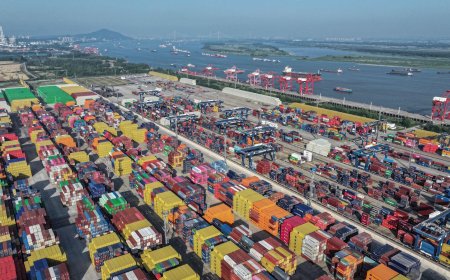Asian Equities Poised to Outperform Amid US Recession: Insights from Raychaudhuri
Explore how Asian equities, including markets in China, India, and Southeast Asia, may outperform U.S. stocks during a potential 2025 recession. Analysis by Raychaudhuri.

Asian Equities May Be Relative Winners in US Recession: Insights from Raychaudhuri
As the global economy grapples with the possibility of a U.S. recession in 2025, investors are reassessing their portfolios. Manishi Raychaudhuri, Head of Asia Pacific Equity Research at BNP Paribas, offers a compelling perspective: Asian equities could outperform their U.S. counterparts during this downturn. (Fed downshift, China easing may cause India to underperform: Raychaudhuri | Company - Interviews - Business Standard)
Understanding the Shift: Why Asian Equities Might Outperform
1. Divergent Economic Indicators
Historically, U.S. assets have been seen as safe havens during global downturns, leading to capital outflows from emerging markets. However, the current economic landscape presents a different scenario. U.S. economic forecasts have been downgraded more significantly than those in Asia, with consumer confidence plummeting and traditional recession indicators flashing warning signs. In contrast, many Asian economies, including China and India, are experiencing more benign or even deflationary conditions, positioning them more favorably. (Asian equities may be relative winner in US recession: Raychaudhuri)
2. Monetary and Fiscal Policy Flexibility
The U.S. Federal Reserve faces limited room for interest rate cuts due to persistently high inflation, and fiscal stimulus is constrained by high debt and deficits. Conversely, Asian economies such as China, India, Indonesia, and the Philippines have lower debt levels and more room for monetary and fiscal easing. This flexibility allows for more responsive economic policies that can support growth during a global slowdown. (Asian equities may be relative winner in US recession: Raychaudhuri)
3. Valuation and Investment Flows
Equity valuations in Asia are currently modest compared to elevated U.S. valuations, reducing the risk of major declines in Asian markets. So far in 2025, Asian markets have already outperformed the U.S. despite geopolitical shocks, indicating growing investor preference. Additionally, currency appreciations in Asian countries like China, Singapore, and India have historically been linked to increased foreign investment, further bolstering the appeal of Asian equities. (Asian equities may be relative winner in US recession: Raychaudhuri, Earnings and FX tailwinds could accelerate Asian equity rotation: Raychaudhuri)
Sectoral Strengths in Asia
Technology Sector
The technology sector in Asian equities has shown robust performance, driven by strong demand for semiconductors and advancements in artificial intelligence and 5G technology. Key players in China and South Korea are at the forefront of these innovations, attracting increased foreign investments and bolstering investor confidence. (Asian Equities Rally as US Recession Fears Fade - Whole Finance Matters)
Financial Sector
Asian financial services, particularly in Japan and Singapore, benefit from regulatory stability and market liquidity. These factors contribute to a resilient financial sector that can weather global economic uncertainties more effectively than their U.S. counterparts. (Asian Equities Rally as US Recession Fears Fade - Whole Finance Matters)
Manufacturing and Consumer Sectors
Manufacturing sectors in India and Vietnam are gaining traction due to supply chain shifts and cost advantages. Additionally, initiatives in China and India to stimulate domestic consumption are expected to drive growth in the consumer sectors, further enhancing the attractiveness of Asian equities. (Asian Equities Rally as US Recession Fears Fade - Whole Finance Matters, Rotation toward Asian equities is just getting started: Raychaudhuri)
Risks and Considerations
While the outlook for Asian equities appears promising, investors should remain mindful of potential risks:
-
Geopolitical Tensions: Ongoing trade tensions and geopolitical uncertainties can impact market stability and investor sentiment.
-
China's Economic Slowdown: A slowdown in China's economy could affect regional growth prospects, particularly in neighboring countries with strong trade ties. (Mild recession in the US may aid Asian markets including India: Credit Suisse's Dan Fineman)
-
Global Trade Dynamics: Changes in global trade policies and supply chain disruptions can influence the performance of export-dependent economies in Asia.
In the face of a potential U.S. recession, Asian equities present a compelling investment opportunity. With favorable economic indicators, policy flexibility, attractive valuations, and strong sectoral performance, Asia stands poised to be a relative winner in the global economic landscape. Investors seeking to navigate the complexities of a U.S. downturn may find resilience and growth prospects in Asian markets.
What's Your Reaction?
 Like
0
Like
0
 Dislike
0
Dislike
0
 Love
0
Love
0
 Funny
0
Funny
0
 Angry
0
Angry
0
 Sad
0
Sad
0
 Wow
0
Wow
0












































































